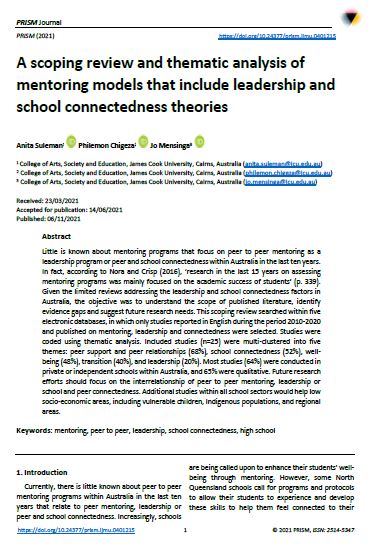A scoping review and thematic analysis of mentoring models that include leadership and school connectedness theories
DOI:
https://doi.org/10.24377/prism.ljmu.0401215Keywords:
mentoring, peer to peer, leadership, school connectedness, high schoolAbstract
Little is known about mentoring programs that focus on peer to peer mentoring as a leadership program or peer and school connectedness within Australia in the last ten years. In fact, according to Nora and Crisp (2016), ‘research in the last 15 years on assessing mentoring programs was mainly focused on the academic success of students’ (p. 339). Given the limited reviews addressing the leadership and school connectedness factors in Australia, the objective was to understand the scope of published literature, identify evidence gaps and suggest future research needs. This scoping review searched within five electronic databases, in which only studies reported in English during the period 2010-2020 and published on mentoring, leadership and connectedness were selected. Studies were coded using thematic analysis. Included studies (n=25) were multi-clustered into five themes: peer support and peer relationships (68%), school connectedness (52%), well-being (48%), transition (40%), and leadership (20%). Most studies (64%) were conducted in private or independent schools within Australia, and 65% were qualitative. Future research efforts should focus on the interrelationship of peer to peer mentoring, leadership or school and peer connectedness. Additional studies within all school sectors would help low socio-economic areas, including vulnerable children, Indigenous populations, and regional areas.
Downloads

Downloads
Published
Issue
Section
License
Authors retain copyright and grant the journal right of first publication with the work.
The version of the article published as part of this issue is licensed under a Creative Commons Attribution-NonCommercial-NoDerivatives 4.0 International Licence and allows others to read, download, copy, distribute, print, search, link to the full text of the first version of this article, or to use it for any other lawful purpose in accordance with the license. The author maintains copyright for the article published in this journal.
This journal provides immediate open access to its content and has no submission or publication fees.


